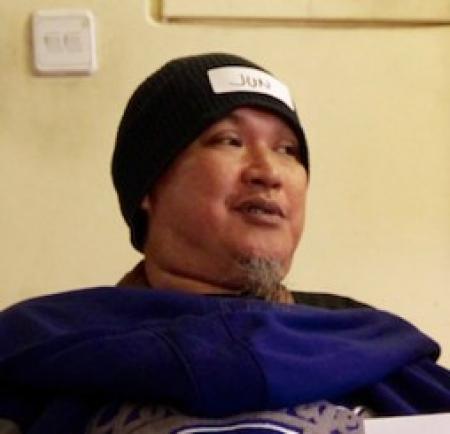
About the Course
This course is designed to bring together key skills to mainstream inclusion into organisations and the wider humanitarian sector. The course builds capacity through building training skills on Sphere and increasing current knowledge on Gender, Age and Disability and supports understanding of ADCAP Minimum Standards for Age and Disability Inclusion in Humanitarian Action. The Core Humanitarian Standard (CHS) is an integral part of the next Sphere 2018 Handbook version and therefore also part of the training.
Date : 24th – 28th July 2017
Training Length : 5 days (9am-5pm)
Location : Bayview Hotel, Ermita, Manila, Philippines
Course Fee : US$50 / PHP2500 – local and national organisations, DPOs and government.
US$250 / PHP 12500 – international organisations and agencies.
Fee is inclusive of all course materials, lunch, snacks and hard copies of
Sphere, ADCAP & CHS handbooks. Please contact us if you have problems
paying the course fee. All other costs including transport and
accommodation are the responsibility of participants/sponsor organisations.
Enrolment : Interested participants must apply via the KoBo Toolbox Questionnaire – Link
https://ee.kobotoolbox.org/x/#Yvfq . Applicants will be informed of
acceptance by the 5th of July and emailed further instructions for payment.
Maximum participants is 21 individuals.
Language : English
Facilitators : Axel Schmidt, Benjamin Bernandino, Ary Anata and Annie Sloman.
Application deadline : 3rd July 2017 via https://ee.kobotoolbox.org/x/#Yvfq
What is ADCAP & Sphere?
ADCAP (Age and Disability Capacity) is the Minimum Standards for Age and Disability Inclusion in Humanitarian Action.
ADCAP was developed for use by all practitioners involved in humanitarian response, with the expectation that the inclusion of people with disabilities and older people is feasible
at every stage of response and in every sector and context.
The Sphere Humanitarian Charter and Minimum Standards in Humanitarian Response provides an ethical and legal backdrop, and minimum standards to guide
humanitarian responses and ensure quality and accountability. They describe conditions that must be achieved in any humanitarian response in order for disaster affected populations to survive and recover in stable conditions and with dignity.
Who should attend?
The course is aimed at individuals from humanitarian agencies with experience in disaster response, prevention, mitigation and/or preparedness. Ideal candidates will have specific responsibilities or interests linked to inclusion, at least a basic working knowledge of Sphere and are willing to facilitate trainings on their gained knowledge.
By the end of the course you will be able to:
• Explore the links between the Humanitarian Charter and humanitarian action
• Explore how to apply the Sphere Handbook, Core Humanitarian Standard (CHS) and Minimum Standard in Age and Disability Inclusion as a tool for disaster response
• Describe the structure and content of the Sphere Handbook
• Demonstrate sound understanding of adult learning methodologies.
• Demonstrate a range of inclusive participatory training methods and techniques.
• Demonstrate the ability to adjust training tools, techniques and content when needed to meet the needs and gaps of participants.
• Navigate the Minimum Standards for Age and Disability Inclusion and Sphere and explain how they complement each other.
• Recognise prejudice and cultural, attitudinal and environmental barriers that people with disabilities, older people and different genders experience.
• Identify key areas where priorities for persons with disabilities and older people can be integrated into humanitarian response and how “most vulnerable” people should participate in humanitarian action.
• Recognise the difference between the medical and the social model of disability.
The Facilitators

Axel Schmidt is a 41 years old German Humanitarian Worker and married father of two young boys. He has 12 years’ experience working in Humanitarian Action in 10 countries. He is also an experienced Sphere and RedR trainer, Nurse Assistant and has a Master in Social Anthropology.

Benjamin (Jun) Bernandino, from the Philippines, is 46 years old and quadriplegic due to spinal cord injury (SCI) c-4 level (1998). He started human rights advocacy work in 2005 as part of the Independent Living Movement of persons with disabilities. He became involved in Disaster Risk Reduction 4 years ago and has participated in trainings and attended forums on the topic, notably Humanitarian Response Trainings and Training of Trainers on SPHERE and ADCAP Minimum Standards.

Ary (Anang) Ananta, from Indonesia, life changed after the 2006 earthquake in Yogyakarta, Indonesia. He became a volunteer to help affected people. Since then he has joined several INGO and NGOs implementing community managed and disability inclusive disaster risk reduction projects. He has been deployed to disasters, contributed to the Indonesian National Standard on Resilient Villages and the Guide for Disability Inclusion Service Unit in disaster risk management, published about building disability inclusive resilience in Central Java and facilitated trainings. He closely works with disabled people organisations and government to advise and promote participatory disaster risk assessment, disability inclusive disaster risk reduction and Sphere.

Annie Sloman, from Australia, has been working in international development and disaster management in South-East-Asia and the Pacific for 14 years. She specialises in training and capacity development, monitoring, evaluation and learning, and organisational and program development and management. She has designed and managed disaster preparedness, response and recovery programs in Indonesia, the Philippines, Timor-Leste and Papua New Guinea. She is also passionate about inclusion for all.
For more details about the training please contact: a.schmidt@asb.de


